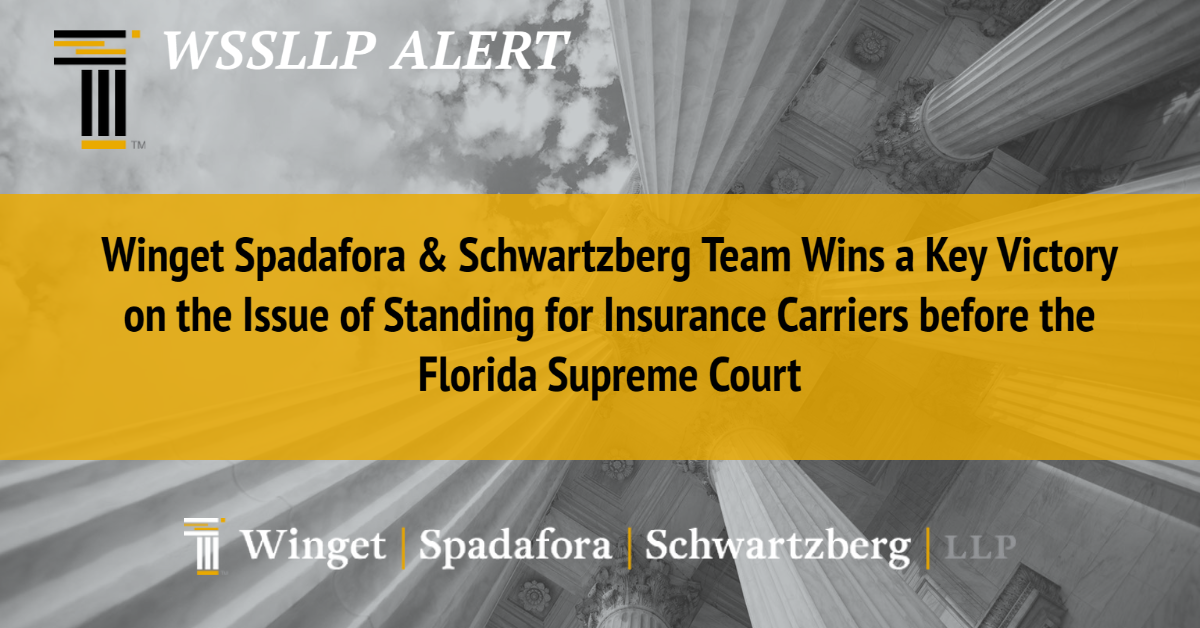Arch Insurance Company brought a legal malpractice action against Kubicki Draper, LLP claiming, among other things, that its delay in raising certain defenses resulted in a higher settlement and constituted legal malpractice. Arch retained Kubicki Draper to defend one of its insureds in an accounting malpractice claim. The trial court and the Fourth District Court of Appeal rejected Arch’s position finding that “the insurer lacked standing to sue the law firm because the insurer and the law firm were not in privity with each other.” The Fourth District also found that “the insurer was [not] an intended third-party beneficiary of the relationship between the law firm and the insured.”
On June 6, 2019, the Florida Supreme Court granted the petition to decide whether an insurer has standing to maintain a malpractice action against counsel hired to represent the insured where the insurer had a duty to defend – certified by the Fourth District Court of Appeal.
On March 4, 2020, the Florida Supreme Court heard oral argument. To find standing, Arch argued that (1) a tripartite relationship existed between the insurer, the insured, and the insured’s defense counsel, (2) principles of equitable and conventional subrogation provide a basis for bringing a malpractice action against the insured’s defense counsel, and (3) public policy in favor of competent insurance defense supports the insurer’s right to hold defense counsel accountable.
On Thursday, June 3, 2021, the Florida Supreme Court unanimously ruled that an insurer has standing through contractual subrogation to maintain a malpractice action against a law firm the insurer hired to defend the insured under its duty to defend obligations, overturning two lower courts’ decisions. In its sixteen (16) page opinion, the Florida Supreme Court stated it agreed with the lower courts’ decisions that Kubicki Draper was in privity with the insured rather than Arch. However, the Court found Arch has standing based on the subrogation provision in the insurance policy issued to the insured.
The Court noted that “[c]ourts are mainly concerned about creating a market for legal malpractice claims.” Cowan Liebowitz & Latman, P.C. v. Kaplan, 902 So. 2d 755, 760-61 (Fla. 2005) (‘The assignment of such claims could relegate the legal malpractice action to the market place and convert it to a commodity to be exploited and transferred to economic bidders who have never had a professional relationship with the attorney and to whom the attorney has never owed a legal duty . . . .’ (quoting Goodley v. Wank & Wank, Inc., 133 Cal. Rptr. 83, 87 (Cal. Ct. App. 1976))). However, the Court determined that the public policy concern does not exist in these circumstances because “[t]he insurer is not a ‘stranger’ to the attorney who is ‘bidding’ on a cause of action and ‘exploiting’ it. To the contrary, the insurer is trying to recover money it paid to its insured from the lawyer it hired. The lawyer is on notice of subrogation claims included in the policy, and Florida public policy does not support shielding the law firm from accountability for its professional malpractice. To the contrary, subrogation exists to hold premium rates down by allowing the insurers to recover indemnification payments from the tortfeasor who caused the injury. . . Accordingly, permitting the contractual subrogation claim alleging the law firm missed a statute of limitations defense to the detriment of the insured supports Florida public policy.”
Florida is now the twenty-ninth (29) state to expressly decide whether an insurer has standing to pursue a malpractice action against the law firm it hired to defend its insured. While the majority recognizes an insurer’s right to pursue a malpractice action against the law firm it hired to defend its insured directly or as a third-party beneficiary, Florida joins the minority that permits an insurer to bring this type of action through subrogation.
Should you have any questions regarding the impact of this ruling, please contact:






